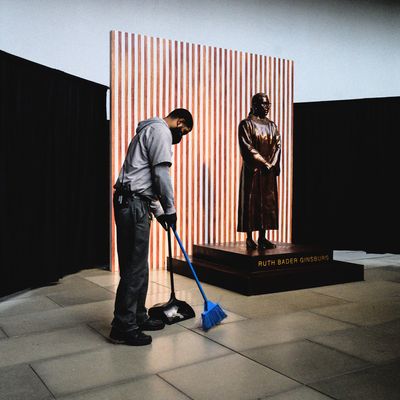
Here’s one thing Grand Central Terminal, the Empire State Building, Rockefeller Center, New York University, all the city’s major museums, and 1,300 office buildings have in common: They’re kept clean and orderly by 20,000 or so janitors and other commercial cleaners whose four-year union contract expires on December 31. As New Yorkers prepare their customary end-of-the-year gifts to the army of doormen, security guards, and other frontline workers who keep the city going, they should also remember to maintain moral support for the janitors, who are in for a bruising labor fight.
Collective-bargaining negotiations are set to start in early November between Local 32BJ of the Service Employees International Union and the Realty Advisory Board on Labor Relations, a coalition of property owners. Things are likely to get contentious.
“We’re anticipating this to be a hard bargain,” Sinon Davis-Cohen, a spokesman for the union, told me. “We’re really preparing for a strike in a way that this workforce hasn’t prepared in a while.”
Davis-Cohen says the union expects property owners to seek concessions and deny or limit raises to workers because many office spaces have been vacant or underused since the pandemic. But the head count of commercial cleaners has already declined by 2,000 since COVID hit, which suggests the market has taken the pandemic-induced slowdown into account.
“The industry has reduced the amount of cleaning it does because of the high vacancy, but the workers that remain are totally essential,” Davis-Cohen told me. “A lot of them are saying actually that their workloads have increased because of sanitation and because there’s fewer workers in the building.”
And it’s important to remember that the virus took a fearsome toll among these frontline workers: 45 building workers died in the early days of the pandemic, many of them cleaners who were deemed essential employees but not provided with the protective gear needed to stay safe. They have every right to seek raises, and that is what they plan to ask for. A janitor with a bit of job tenure can make a living wage of $29 an hour. Equally important are health benefits with the premiums paid by employers.
That’s likely to be a point of contention; the union is warning employers against seeking to have workers pick up part of their health-insurance premiums, a shift the union calls a line in the sand.
As both sides prepare to go into bargaining, we should all insist that the bosses do right by these folks, who are the backbone of our city. I recently had the pleasure of meeting many of them at the annual Building Service Worker Awards hosted by Strauss Media and 32BJ.
One of the people honored at the event was Donna Klimas, who shows up at 40 Worth Street at 4 p.m. every day and leads a team of 14 that cleans the building until 11 p.m., a feat Klimas manages even while battling pancreatic cancer. Another stalwart member, Virginia Gomez, won the Longevity Award for cleaning the offices at 1270 Sixth Avenue six days a week for the last 34 years.
Longtime worker Steven Purvey has been a window washer for 40 years, following in the footsteps of his uncle, brother, and other family members. Getting a license to clean windows takes two years of apprenticing and passing tests on model equipment set up in classrooms. Eventually, washers go out on scaffolds perched high above the city. “Sometimes the scaffold breaks down while you’re on it, and you’ve got to know how to handle it until the maintenance company gets there,” Purvey told a reporter from Strauss Media. “It can go on for an hour or even five to six hours.”
Although dangerous, Purvey’s union job provides sufficient pay and benefits for him to put a daughter through Northeastern University, where she graduated with a computer-science degree. “Thanks to this industry, it was able to happen,” he says — and that’s the whole point. Solid union jobs allow families to move into the middle class in a single generation — an economic miracle that our city reproduces over and over, one grueling shift at a time.
In this year of high-profile labor battles that has seen strikes by Hollywood writers, screen actors, autoworkers and Amazon-warehouse employees, let us hope New York’s janitors get the raises and respect they deserve. The last time building workers went on strike, in the winter of 1996, it was a miserable monthlong affair. As the New York Times noted: “Building supervisors are cleaning toilets and are asking tenants, be they lawyers or investment bankers, to empty their wastebaskets in central bins next to elevator banks. In some buildings, the management is providing tenants, from accountants to advertising executives, with dust cloths so they can clean their desks themselves.”
Nobody should want a replay of that grim standoff. This first post-pandemic contract is one where the extraordinary value of these frontline workers should be recognized and compensated fairly — not only as thanks for their extraordinary service during the COVID crisis but as a sign that we understand, honor, and support their journey into the middle class.
More From This Series
- New York City’s Next Mayor Needs You
- How Desperate Will Eric Adams Become to Woo Trump and Get a Pardon?
- Finding Jordan Neely






























